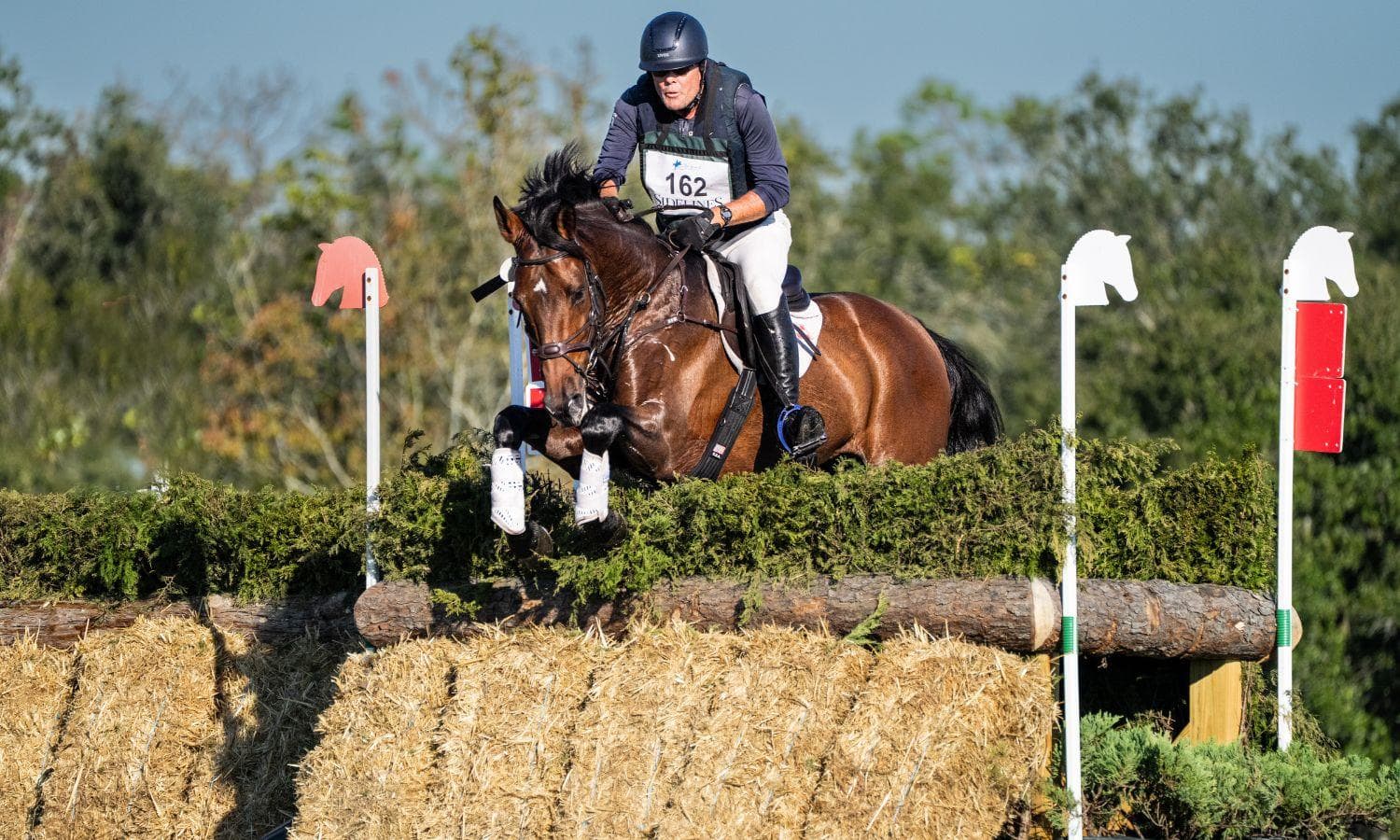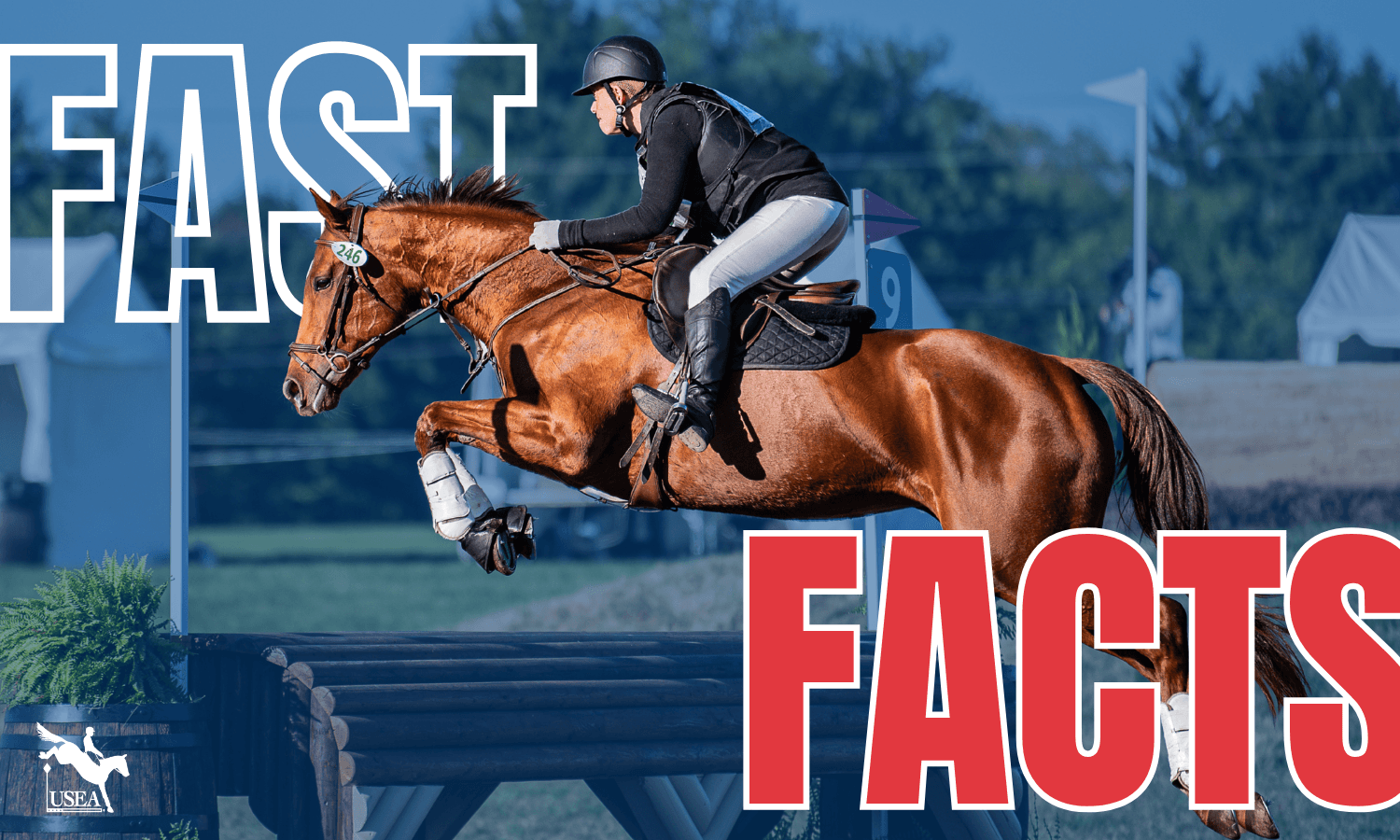The VIP Volunteer: Debra Sue Waters

Since the mid-’80s, lifelong horsewoman and professional artist Debra Sue Waters has devoted countless hours to the sport of eventing, and last year topped the rankings of the USEA Volunteer Incentive Program in Area V.
Assisting behind the scenes at an event just comes naturally to the Millsap, Texas, resident.
“I like to plan things out and see them come together,” she said. “I like to be around the people during the activities, shows, and events, but love the calm before the crazy when planning an activity or decorating the courses prior to the events. It’s rewarding seeing the things come together and the compliments during the activities or events. Someone once said I have a ‘take charge personality.’ I took it as a negative comment, but they went on to say that I see a need, and I take charge and make sure it gets done.”
Waters volunteers and decorates for Willow Draw’s horse trials in Weatherford, Texas, twice a year and also helps them with their schooling shows. “I saw a need at a local horse trial years ago and started decorating for them,” she explained. “My little sideline grew from there. I decorated the AEC courses when they were at Texas Rose and had the pleasure of working with both Captain Mark Phillips and Richard Jeffries. I’ve learned a lot from some great course builders and designers over the years.”
For as long as she can remember, horses have always been a part of Waters’ life. “My maternal grandfather raised Tennessee Walking Horses, and my paternal grandfather had a large cattle operation, raising Brangus cattle and Quarter Horses. Some of my first memories are riding ponies at Pop and Mom’s farm.”
She initially heard about eventing after her parents bought land outside of Birmingham, Alabama, when she was 7 years old. “It was within hacking distance of Patchwork Farm, a boarding stable owned by Pat and Chauncey Thuss. Cahaba Pony Club met there, and they held a recognized horse trials [Cahaba Horse Trials] as well as hunter shows and hunter paces.”
Like many event riders, Waters’ foray into the sport was on a rather unconventional breed. “My first horse was a 15-hand Tennessee Walking Horse that my other grandfather gave me,” she said. “I actually taught her to jump and to trot, after miles of trot poles and cavaletti, and went on to event her. We did fine unless she was tense, and then she reverted to her natural ‘running walk.’ I had some interesting comments on my dressage tests whenever this happened. She could and would jump anything though, so as an 11-year-old, dressage was just one of those things we endured to get out on the cross-country course.”
Years later, after earning a college degree in interior design, Waters quickly learned her 9-to-5 job in front of a drafting table wasn’t the life for her—the horse world was calling. “I was making more money teaching riding on the weekends than I was slaving away at my ‘real job,’” she explained. “A life change sent me to Louisiana where I taught riding at a private girl’s school. I realized I needed more than just a love of horses to succeed in the industry. At the time, there was really nothing offered, other than college programs, for instructors wishing to be certified. I researched the British Horse Society Certifications and made the decision to move to England. I then returned to the U.S. to teach at a BHS-affiliated stable in Texas, where I taught and trained. I met my husband, Ken, there and have called Texas home since then.”
Turning Point Farm became their foundation for the horse business and her artistic endeavors. “We looked for over five years for the land,” she recalled. “When I found this place, solely by accident, I knew it was where we wanted to raise our kids and four-legged family. We built the barns specifically with the idea of hosting Pony Club meetings and activities, and housing my art studio.”
Waters has always been an advocate of Pony Club and the solid background it develops in riding and horse care and has volunteered for the organization since her early 20s. “Due to Pony Club’s emphasis on seat and position, I specifically sought training in biomechanics of both the horse and rider to better teach and train. Consequently, I have had the opportunity to work with many different disciplines and levels of horses and riders. Balance and effectiveness are basically the same, no matter the tack and the breed.”
Over the years she dabbled in many disciplines, besides Intermediate level eventing. “I’ve also ridden and competed Western, flat-shod Walking Horses, fox hunters, show hunters, jumpers, and dressage through Prix St. Georges,” she said. And though she no longer competes, she still coaches and teaches, and whips in for her local hunt, the Brazos Valley Hounds.
It’s no surprise that Waters enjoys the spirit of volunteerism—it’s a family tradition, after all. “My mom volunteered in the family court system, teaching a Bible study class to kids in the system, from the time I was in preschool until she could no longer drive herself there to teach,” she said. “I started volunteering in the local Pony Club when I was in college and literally volunteered my way across the country, teaching and prepping in local clubs. My family always volunteered for the events, trials, and shows at Patchwork, so I naturally volunteered for the local horse shows once I moved to Texas. I started decorating the stadium and cross-country courses once I saw the need. My background in design just wanted things to look nice, while the trainer in me wanted the jumps to ride well.”
Her advice to other folks interested in volunteering? “Be willing to spend more time than you planned on whatever it is you are doing. Be flexible and willing to do the not-so-glamorous stuff. Lastly, follow directions, even if you have a better idea. This is a hard one for me!”
Waters always encourages her students—and their families—to volunteer whenever they can. “They can learn so much by being behind the scenes at some of the events, but most importantly, these horse related activities we all enjoy can’t function without a huge volunteer base,” she said.
Plus, she added, volunteers never know who they might meet at an event. “I had two Pony Clubbers who were doing their H-B certification and needed a Land Conservation Project,” she said. “They volunteered to help me prep and decorate the AEC courses at Texas Rose. Captain Phillips came out as we were finishing up and was talking to the girls about volunteering. They explained what they were doing and how by volunteering at events they were helping keep land available for horse-related activities. They described the reports they had to make and turn in at their testing and how important volunteering was for eventing. I suggested they take a picture with him to add to their report. After he left, one of the girls turned to me and asked, ‘Remind us who that nice man is.’ After telling them who he was, they were embarrassed that they didn’t recognize him, but both admitted they would have been too nervous to explain their projects if they had known who he was.”
Besides introducing young people to legends of the sport, being around the horses—and the people who love them—is her favorite part of eventing. “The sport has changed significantly over the years, but there is still that connection,” she said. “I did the hunters when I was younger, and the atmosphere at those shows was different from the events. Eventers seem to be more inclusive. The backyard kid on the backyard horse can still compete and do well.”
Though Waters doesn’t volunteer around Area V as much as she once did, she’s thrilled to continue her involvement in the sport. “I am happy to be able to keep teaching and traveling for clinics and camps and doing my artwork. I have been so blessed to make a living doing the things I love the most. Not everyone can say that.”

About Mrs. Pastures Cookes for Horses
Founded in 1986 by California horsewoman Patricia Burge, Mrs. Pastures Cookies for Horses began with the goal of creating a wholesome, delicious treat for a greatly beloved, yet very fastidious horse. Over the next three decades, the family-owned company became a tremendous success — known nationwide for their great taste, simple ingredients, and highly recognizable, red-lidded jars.
35 years later, Alltech proudly acquired the Mrs. Pastures business, with the intent of building upon the success of the company’s original recipe and expanding the product line to meet the ever-evolving needs of the equine industry and horse lovers everywhere.
With an enduring commitment to nourishing the bond between horses and their humans, Mrs. Pastures cookies often serve as everything from a positive reinforcement-based horse training incentive to a simple reward for a job well-done. To learn more or to find a retailer near you, visit mrspastures.com.
Want to stay up to date on the many exciting new product releases and updates from Mrs. Pastures? Click here: https://forms.office.com/r/q59kkxPhhm
About the USEA Volunteer Incentive Program
Volunteers are the lifeblood of our sport, the unsung heroes, and the people who make it possible to keep eventing alive. In efforts to recognize the dedication, commitment, and hard work that volunteers put into eventing, the USEA formed the Volunteer Incentive Program (VIP) in 2015. In 2017, an online management portal was designed for volunteers, organizers, and volunteer coordinators at EventingVolunteers.com, which is also available as an app for iOS and Android.
Volunteer incentives include national and area recognition, year-end awards, a top ten USEA Volunteer leaderboard, and a Volunteer of the Year award which is given to the volunteer who accumulates the most volunteer hours on EventingVolunteers.com at recognized events throughout the USEA competition year. Click here to learn more about the USEA Volunteer Incentive Program.















